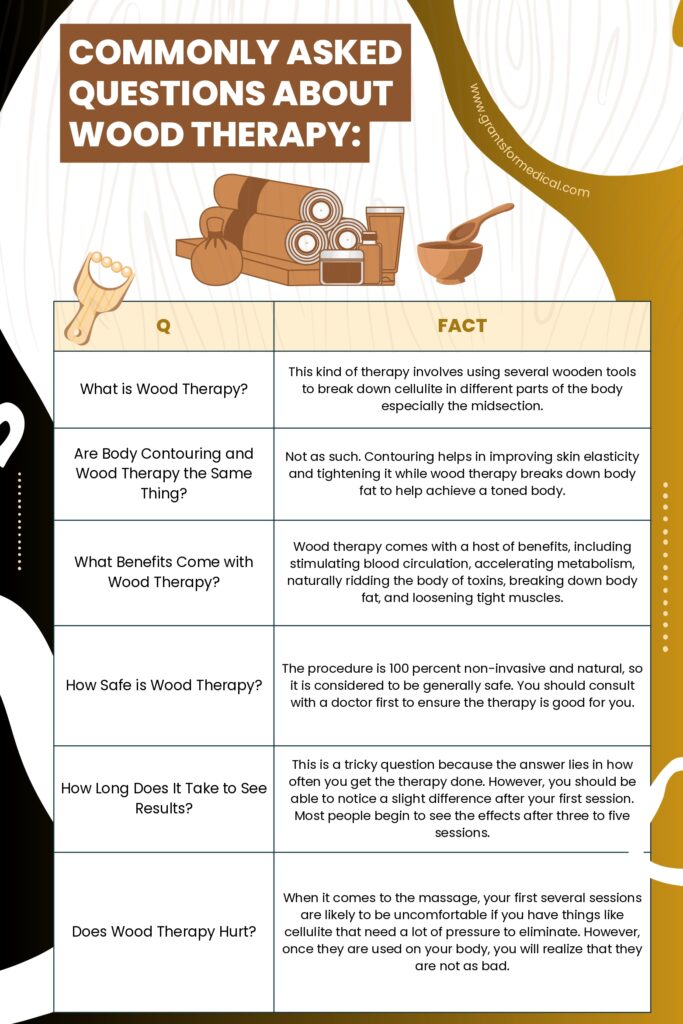Commonly Asked Questions About Wood Therapy
Body contouring is a popular phenomenon today, and people place a lot of importance on their looks.
From cool sculpting to fat cavitation, many unanswered questions about such procedures exist.
Here, we will address some questions regarding wood therapy that may help you decide whether to go for the procedure or not.

1. What is Wood Therapy
Wood therapy, or maderoterapia, involves using specially designed wooden tools to massage and sculpt the body. It potentially improves blood circulation and promotes lymphatic drainage, though its effectiveness for improving body size and proportions lacks robust scientific evidence. While it is popularly believed to target cellulite and fat in areas like the midsection, its effectiveness can vary and lacks substantial scientific backing as a method to ‘break down’ cellulite definitively.
2. Are Body Contouring and Wood Therapy the Same Thing
Body contouring is a broad term that includes various procedures to reshape body areas, whereas wood therapy is a specific technique using wooden tools for massage and potential body sculpting. Contouring helps improve skin elasticity and tighten it, while wood therapy breaks down body fat to help achieve a toned body.
3. Is Wood Therapy Effective?
The effectiveness of wood therapy varies among individuals and scientific evidence supporting its benefits, especially for fat reduction and cellulite removal, is limited. You also have to consider other factors like the consistency of treatment, weight, and age.
4. What Benefits Come with Wood Therapy
Wood therapy may help with muscle relaxation and possibly improve blood circulation.
5. How Safe is Wood Therapy
While wood therapy is non-invasive and uses natural wooden tools, the safety and appropriateness of the therapy should be evaluated on an individual basis, considering personal health conditions. However, as with any body manipulation therapy, individual risks may exist, especially for those with certain health conditions. It is advisable to consult a healthcare professional before starting any new treatment to ensure it is appropriate for your health status and won’t interfere with existing conditions or treatments.
6. What Does it Feel Like
Individuals may experience varying degrees of comfort during wood therapy sessions, with some reporting discomfort, especially in areas with more sensitivity or tension. You must work with your therapist to decide how much pressure should be applied.
7. Does Wood Therapy Hurt
The tools used in wood therapy are designed for massage and should not cause immense pain, although discomfort may occur depending on the technique and individual sensitivity.
However, once they are used on your body, you will realize they are not as bad.
Nonetheless, when it comes to the massage, your first several sessions are likely to be uncomfortable if you have things like cellulite that need a lot of pressure to eliminate.
After several wood therapy sessions, you will be more relaxed and enjoyable.
8. How Long Does It Take to See Results
Noticeable results from wood therapy can vary and are subjective. Some individuals report changes after a few sessions, though there is no guarantee of a specific outcome. While some may report slight changes after the first session, managing expectations and understanding that results can be subtle and gradual is important. A series of sessions, often recommended by the therapist based on individual goals and conditions, is typically necessary to achieve more significant outcomes.
9. Are its Results Permanent
The persistence of any potential benefits from wood therapy likely requires ongoing sessions and may also depend on lifestyle factors. However, it’s important to note that claims regarding the permanency of results should be approached with caution. The sustainability of wood therapy outcomes depends on various factors, including lifestyle, diet, physical activity, and individual body response. Continuous treatment can help maintain results, but a holistic approach to health and wellness is also crucial for long-term benefits.
10. Can Wood Therapy be Done at Home
Self-administered wood therapy at home without proper training may increase the risk of injury or discomfort; professional guidance is recommended for effective and safe application. Without proper technique, there’s a risk of bruising or discomfort. If you’re interested in at-home wood therapy, consider seeking guidance or training from a certified practitioner to ensure proper technique and maximize benefits.
Nevertheless, since a professional will not provide your home therapy sessions, you are less likely to enjoy the full benefits of a professionally done job.
This can be compared to the massages given at home by a partner and those done at a facility.
While the former can be romantic and stress-relieving, they won’t deliver long-term relief as a professional one would.
Final Thoughts
These are some of the questions that appear the most regarding wood therapy and body contouring in general.
After going through them, you should better understand what the therapy can do for you and whether it is worth getting.
See Also
What to Expect From a Weight Loss Surgery
What Insurance Companies Cover Weight Loss Surgery